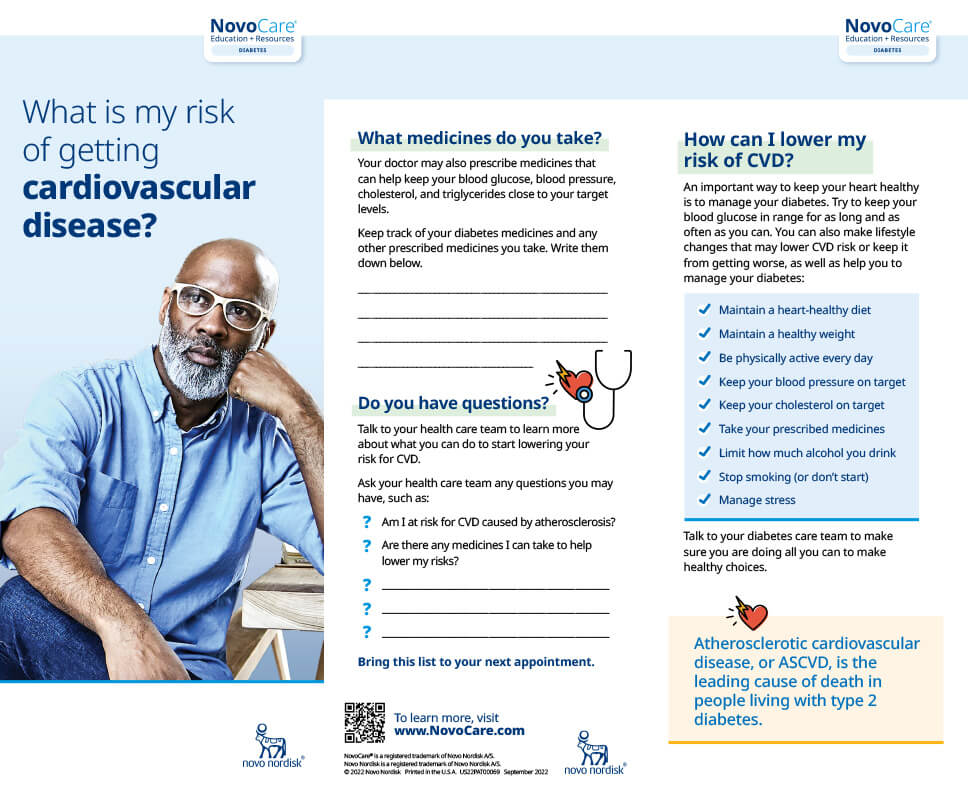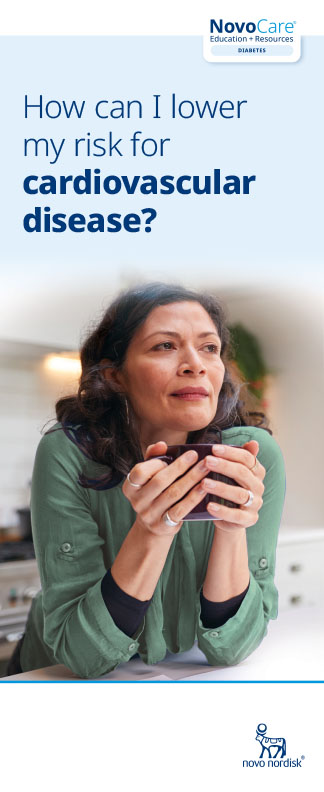Talking to your patients with type 2 diabetes about cardiovascular disease
Actor portrayal
Curated facts and patient-friendly language may help patients with type 2 diabetes (T2D) appreciate the importance of their cardiovascular health and take a more active role in their treatment plan.
Setting context
Cardiovascular disease (CVD) is a general term for all types of conditions that affect the heart and blood vessels.1
CVD is associated with conditions like:
- High blood pressurea
- High LDL (bad) cholesterol and low HDL (good) cholesterolb
- High triglycerides, a type of fat in the blood1,c
People with type 2 diabetes are more likely to have these conditions.1
CVD includes symptoms like:
- Shortness of breath
- Fatigue
- Pain in the chest, throat, back, legs, neck, jaw, upper abdomen, or arms
- Weakness or numbness in arms or legs2
Many forms of CVD are called
atherosclerotic CVD (ASCVD), which
involves the buildup of plaque
in the body’s arteries.3
Actor portrayal
ASCVD can lead to serious problems like:
- Stroke, which is when a blood vessel leading to the brain is either blocked or bursts4
- Coronary heart disease, where plaque builds up in the heart’s arteries5
- Peripheral artery disease (PAD), where plaque narrows arteries that carry blood to other parts of the body, such as the legs and feet5
aStage 1 hypertension is defined as systolic blood pressure of 130-139 mm Hg or diastolic blood pressure of 80-89 mm Hg.6
bLow-density lipoprotein (LDL) contributes to fatty buildups in arteries, known as atherosclerosis. High-density lipoprotein (HDL) helps by carrying some LDL away from the arteries and into the liver, which processes it. A patient’s LDL number should not be the main factor in guiding treatment to prevent heart attack and stroke.7,8
cNormal triglyceride levels vary by age and sex.8
Communicating risk
Type 2 diabetes and cardiovascular disease often go hand in hand.
ASCVD is the #1 cause of death and disability among people with T2D9
People with T2D have a 2–4x higher risk of stroke or heart attack vs. those without T2D10-12
Actor portrayal
ASCVD occurs 14.6 years earlier for people with T2D vs. people without T2D13
Making a plan
Treatment options may include medications that treat diabetes and reduce CVD risk at the same time.
What are the options?
GLP-1 RAs (glucagon-like peptide-1 receptor agonists) help the pancreas release more insulin when blood sugar is high, help prevent the liver from making and releasing too much sugar, and slow down food leaving the stomach.14
SGLT-2is (sodium-glucose cotransporter 2 inhibitors) help the body get rid of excess glucose by eliminating it in the urine.14
What is their relationship to CVD?
Some GLP-1 RA products have helped prevent cardiovascular (CV) events like stroke and heart attack in patients with T2D, particularly those with established ASCVD.14
Many SGLT-2i products have helped prevent CV events, along with reducing the risk of hospitalization due to heart failure.14
Staying committed
You can share these brochures with patients to remind them of important information and steps they can take.
Actor portrayal
Support program for diabetes patients with or at risk of ASCVD
The American Diabetes Association and the American Heart Association, along with Novo Nordisk and other industry leaders, have joined forces to create Know Diabetes by Heart™. This groundbreaking initiative provides a variety of resources to empower patients to better manage their risk for CVD, heart attacks, and strokes.
References:
- Centers for Disease Control and Prevention. Diabetes and your heart. Reviewed May 7, 2021. Accessed February 28, 2022. https://www.cdc.gov/diabetes/library/features/diabetes-and-heart.html
- American Diabetes Association. Diabetes complications – Cardiovascular disease. Accessed February 28, 2022. https://www.diabetes.org/diabetes/cardiovascular-disease
- American Heart Association. What is cardiovascular disease? Reviewed May 31, 2017. Accessed March 4, 2022. https://www.heart.org/en/health-topics/consumer-healthcare/what-is-cardiovascular-disease
- American Stroke Association. About stroke. Accessed February 28, 2022. https://www.stroke.org/en/about-stroke
- American Heart Association. Atherosclerosis. Accessed March 4, 2022. https://www.heart.org/en/health-topics/cholesterol/about-cholesterol/atherosclerosis
- American Heart Association. The facts about high blood pressure. Reviewed November 30, 2017. Accessed February 28, 2022. https://www.heart.org/en/health-topics/high-blood-pressure/the-facts-about-high-blood-pressure
- American Heart Association. Cholesterol: The good and the bad. Reviewed November 6, 2020. Accessed February 28, 2022. https://www.heart.org/en/health-topics/cholesterol/hdl-good-ldl-bad-cholesterol-and-triglycerides
- American Heart Association. Cholesterol and diabetes. Reviewed May 4, 2021. Accessed February 28, 2022. https://www.heart.org/en/health-topics/diabetes/diabetes-complications-and-risks/cholesterol-abnormalities--diabetes
- Low Wang CC, Hess CN, Hiatt WR, Goldfine AB. Clinical Update: Cardiovascular Disease in Diabetes Mellitus: Atherosclerotic Cardiovascular Disease and Heart Failure in Type 2 Diabetes Mellitus - Mechanisms, Management, and Clinical Considerations. Circulation. 2016;133(24):2459-2502.
- Almdal T, Scharling H, Jensen JS, Vestergaard H. The independent effect of type 2 diabetes mellitus on ischemic heart disease, stroke, and death: a population-based study of 13,000 men and women with 20 years of follow-up. Arch Intern Med. 2004;164(13):1422-1426.
- Fox CS, Coady S, Sorlie PD, et al. Trends in cardiovascular complications of diabetes. JAMA. 2004;292(20):2495-2499.
- Martín-Timón I, Sevillano-Collantes C, Segura-Galindo A, Del Cañizo-Gómez FJ. Type 2 diabetes and cardiovascular disease: Have all risk factors the same strength? World J Diabetes. 2014;5(4):444-470.
- Booth GL, Kapral MK, Fung K, Tu JV. Relation between age and cardiovascular disease in men and women with diabetes compared with non-diabetic people: a population-based retrospective cohort study. Lancet. 2006;368:29–36.
- Das SR, Everett BM, Birtcher KK, et al. 2020 Expert consensus decision pathway on novel therapies for cardiovascular risk reduction in patients with type 2 diabetes: a report of the American College of Cardiology Solution Set Oversight Committee. J Am Coll Cardiol. 2020;76(9):1117-1145.

